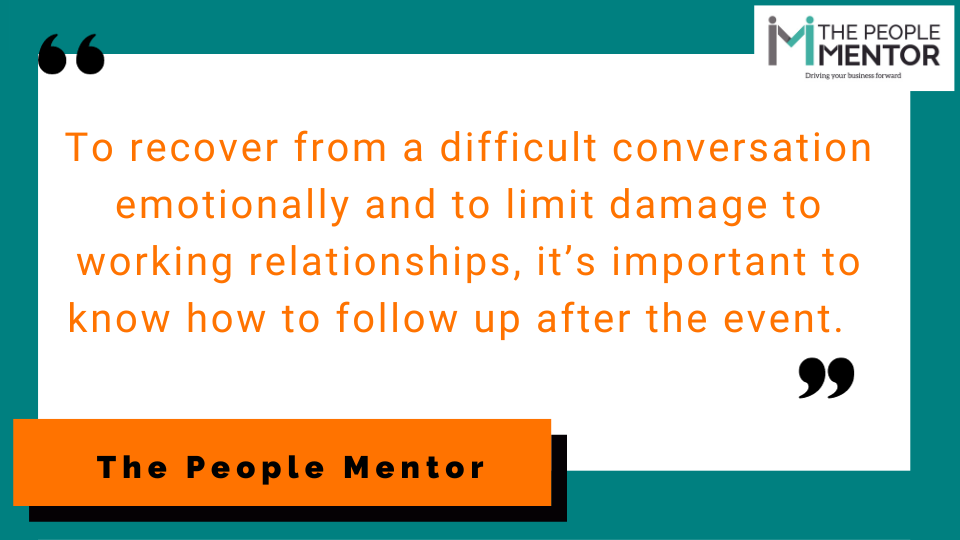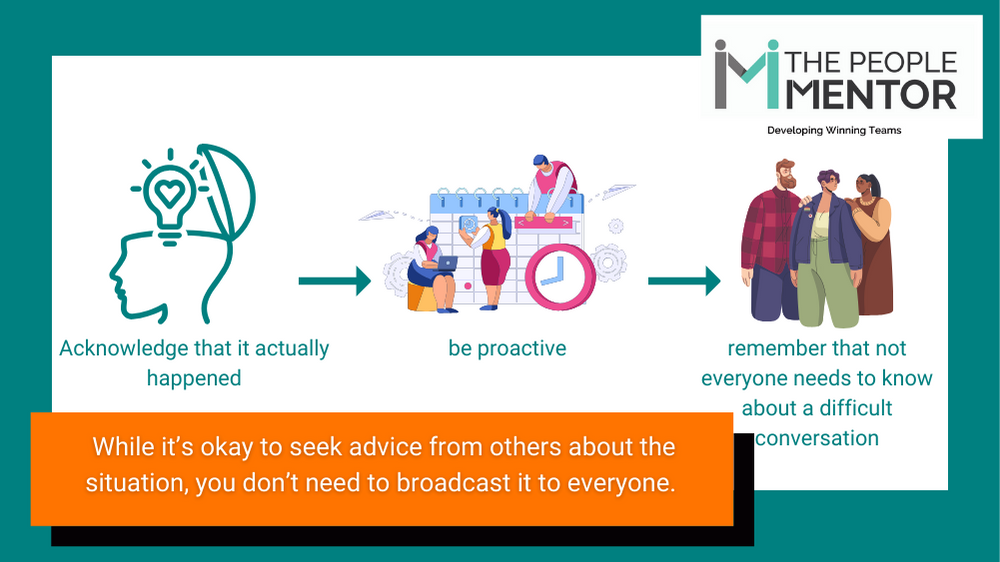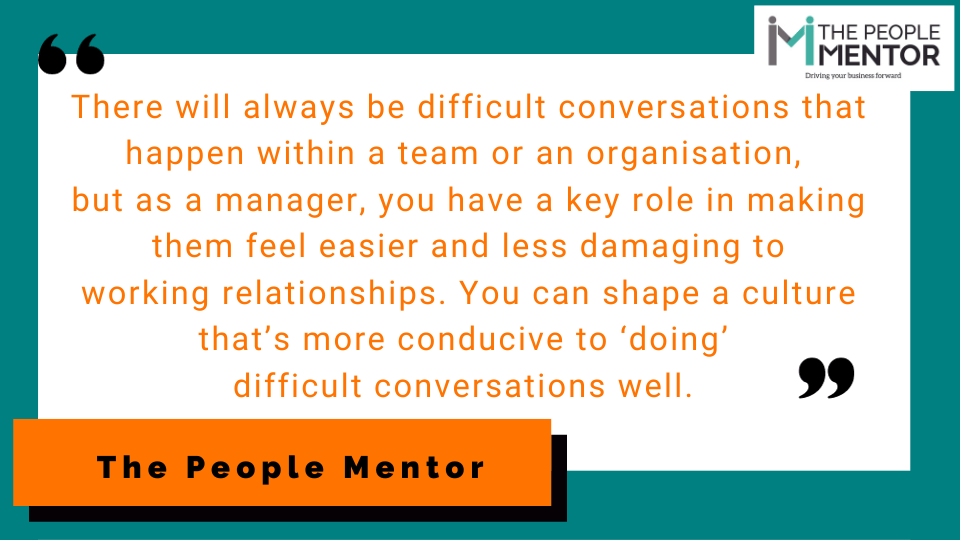Hi, I’m Nicola from The People Mentor.
In today’s podcast, I’m going to answer a question that someone has asked me about difficult conversations. Often, we think about how to prepare for the conversation or how to have it, but how often do we think about what to do afterwards?
This is the subject of today’s podcast. Hopefully, you’ll relate to some of the issues and take away something that’s going to help you.
So here goes…
“ Hi Nicola,
I’ve recently moved to a new department at work. In my old department, I was listened to and was always comfortable sharing my ideas and giving people my opinions. However, at a recent meeting with a couple of senior managers in my new department, when I presented some ideas about a project, they were immediately rejected. I was told that my ideas were ridiculous and were never going to work. I came out of the meeting feeling so demoralised and like I wasn’t at all valued. What would your advice be in this situation?”
After an experience like this, it would be tempting to get angry, upset, or completely disengage. But my advice was to take the lead in the situation and draft an email to the managers, acknowledging that the conversation was challenging, but focusing on the positives-that you’d all managed to identify and discuss some things.
It would also be useful to acknowledge that though your ideas weren’t accepted on this occasion, you are willing to accept feedback from them and others in the department, and then come up with some new ones.
This doesn’t take away the fact that you felt aggrieved, but it is a more positive place to move forward from.
After a really difficult conversation, you probably think about how glad you are that it’s over and that you never want to experience something like that again.
The thing is, to recover from a difficult conversation emotionally and to limit damage to working relationships, it’s important to know how to follow up after the event.

What should you say and do to make things feel less strained and to help everyone move forward?
Here are my tips for recovering after a difficult conversation.
The first is to acknowledge that it happened. Even if every part of you wants to forget about it all, don’t. It doesn’t just leave you stuck in no man’s land working out what to do, it leaves the other party feeling like that too.
No, you don’t have to spend your days trying to avoid the other person, instead, accept that you were just two people who found yourself in a difficult situation.
Tip two is to be proactive. Send an email acknowledging that it was a tough situation but you were glad that you were able to come together and get that big issue out in the open. Thank the other person for taking the time to have the conversation.
The next important thing is to remember that not everyone needs to know about a difficult conversation. It’s tempting to want to vent to others about it, but it’s best to keep things professional. While it’s okay to seek advice from others about the situation, you don’t need to broadcast it to everyone.
After a difficult conversation, the next thing you need to do is to think about how to move things forward. Write an email as a written record of the conversation, who was involved, and any differences in perspective or understanding. The email should focus on the outcomes you both want as well as an action plan of the next steps that create a path forward.

There will always be difficult conversations that happen within a team or an organisation, but as a manager, you have a key role in making them feel easier and less damaging to working relationships. You can shape a culture that’s more conducive to ‘doing’ difficult conversations well.
You can model doing the work and building good relationships that will endure difficult conversations. You can pay attention to the relationships you have with people outside of any challenging conversations. You can start by working with your people to create positive working relationships going forward.
Get together with them and discuss things like;
What does success look like in our working relationship?
What is important to both of us?
Is there anything that either of us needs to be aware of that might prevent us from having a fruitful and healthy working relationship? – I’m thinking of things like differences in communication style, personality, and how people like to work. Carrying out a DISC assessment can give you a better understanding of what makes people tick and how to work and communicate better with them.
Building good relationships is of course not just important on an individual level. It’s important to focus on creating that sense of being a team, working towards a common goal. If you have the sense of ‘we’re all in this together’ it makes difficult conversations feel far easier and less destructive.
Recovering from a difficult conversation and focusing on building good relationships going forward is not easy, but it’s something you can work on. And like everything, you get better at it with practice.
Would you rather be known as the manager who rants, raves, and belittles people after a difficult conversation, or do you want to be seen as a proactive collaborator who nurtures relationships?

No one likes an uncomfortable conversation. But often with difficult conversations, it’s about reframing them. What have they brought to light that can be improved and worked on? The chances are that you’ll learn more from a conversation like this than any other.
I can remember an occasion when I was trying to help a team member with the pressures he was facing. We had a conversation and I left him thinking about what the solution was. When I returned to work he had blown it up in his head and complained to my manager. Rather than avoid discussing it I approached the team member and apologised he had misunderstood me and I hadn’t put things the right way.
Together we sat down and drew up the actions. That was an experience I learnt from.
Do you feel like you need some support with having difficult conversations?
Do you feel like you’re just ‘winging it’ or avoiding them altogether?
Are people disengaged and is performance suffering?
My ‘Making Difficult Conversations Easier’ programme is all about creating managers who have the confidence to deal with problems, hold difficult conversations, and build engagement to create an open, honest, and enthusiastic workforce.
Imagine having a more harmonious team, that performs better, and is more productive and profitable. Imagine that everyone wants to work together for the good of the business.
It’s all possible.
Get in touch to book a discovery call.
That’s all from today’s podcast. I hope it gave you some food for thought and it makes some of your dreaded difficult conversations feel that bit easier.
Goodbye for now, and see you next time.






